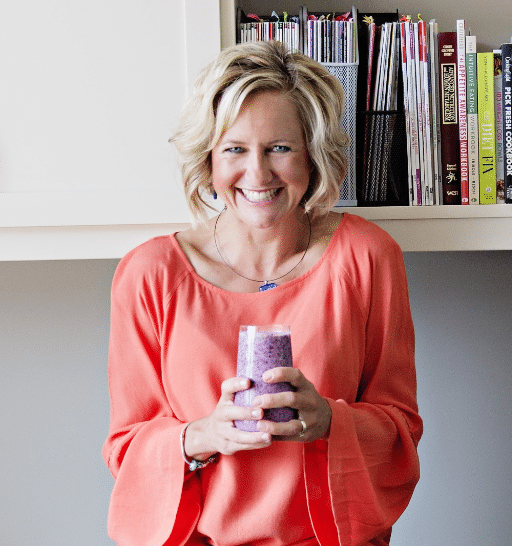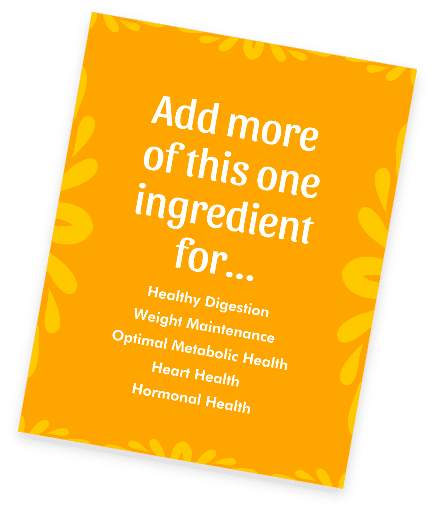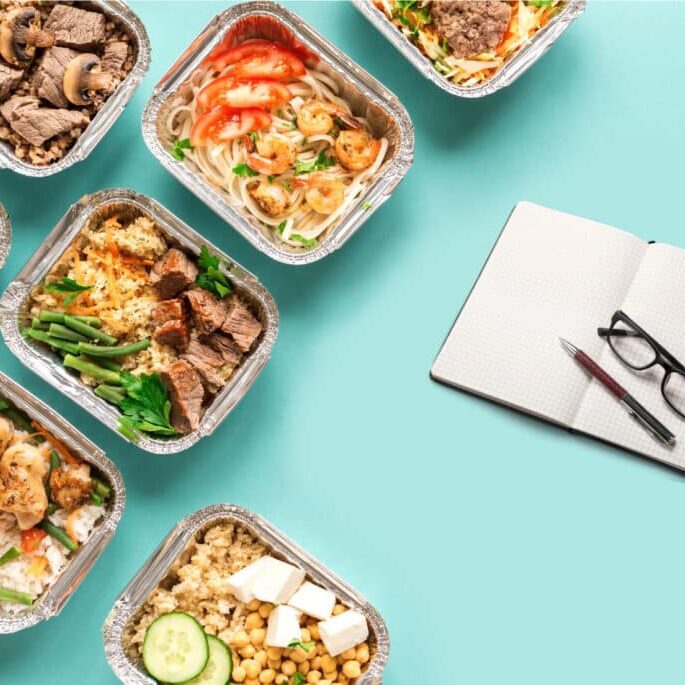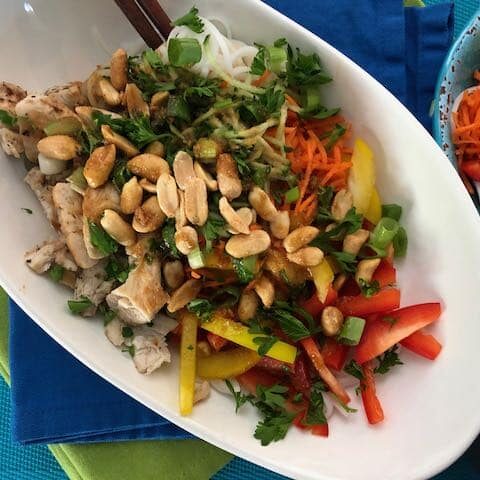Does oatmeal have enough protein for breakfast?
I am a big fan of oatmeal. As a whole grain, rich in fiber, oatmeal provides slow-release energy so you are fuelled for your morning. Does it provide enough protein?
How much protein do we need each day?
How much protein you need each day is based on how much you weigh. That makes sense – bigger cars need more gas. The recommended dietary allowance for protein among adults is 0.8 g protein per kilogram of body weight per day (0.8 g/kg/day). However, international expert groups have questioned whether this amount of protein is optimal to prevent age-related loss of muscle mass.
Our skeletal muscles reach peak mass in our third decade of life. As we get older, muscle fibers reduce in size and number, a process that gets faster in the later years of life. If you are not thinking about age-related loss of muscle mass, you should be. Called sarcopenia, the loss of muscle mass associated with normal aging, especially the later years of life, is linked to an increased risk of frailty, falls and loss of independence in older adults (among other health outcomes). And while you are not likely thinking about preventing falls in midlife, you may be noticing a decline in your muscle mass and a slower metabolism. Your body is changing. Your body is aging.
A combination of dietary protein intake along with exercise helps to maintain healthy muscle and prevents the decline in muscle mass as we age. Experts recommend that adults over 50 years get more like 1 – 1.2 g protein/g/day to maintain muscle mass (and even higher intakes for those with acute or chronic disease).
Research from the last few years has shown that muscle protein creation is maximized with exercise, and when protein intakes are spread throughout the day, rather than a large dose just once in the day (which is typically the evening meal). In other words, a steady intake of protein from healthful sources throughout the day, combined with exercise, can help counter the loss of muscle mass seen with aging.
How much protein is recommended per meal? Around 0.4 g protein/kg/meal, or somewhere around 20-30 g protein/meal.
Does oatmeal have enough protein for breakfast?
While there is protein in oatmeal, the amount is a little less than what is usually suggested for a meal. In ½ cup uncooked large flake oats, there are 8 g protein. So, this amount is a little less than the suggested 20-30 g protein/meal. What can you add to your oatmeal to increase the protein in your breakfast oatmeal?
I have put together this list of oatmeal toppers to bump up the protein (along with fiber, which is important for gut health and fullness) in your oatmeal at your breakfast.
Oatmeal toppers to bump up the protein in your oatmeal:
| Protein | Fiber | |
|---|---|---|
| ½ cup large flake oats, uncooked | 8 g | 5 g |
| 2 tsp natural peanut butter | 2.7 g | 0.9 g |
| PB2 powder, 2 tbsp | 5 g | 2 g |
| Protein | Fiber | |
|---|---|---|
| 1 tbsp chia seeds | 3 g | 4 g |
| 1 tbsp ground flax | 1.3 g | 1.9 g |
| 1 tbsp hemp hearts | 3.3 g | 0.3 g |
| 2 tbsp almonds | 3.6 g | 1.9 g |
| 2 tbsp walnuts | 1.9 g | 0.8 g |
| 2 tbsp pumpkin seeds | 6 g | 1 g |
| ½ cup Blueberries, | 0.6 g | 1.8 g |
| ½ chopped pear | 0.3 g | 2.8 g |
| ½ large apple, chopped | 0 g | 3 g |
| Protein | Fiber | |
|---|---|---|
| 1 cup soy milk | 7 g | 1 g dietary |
| Skim milk powder (2 tbsp) | 5 g | 0 g |
| 1/2 cup Greek yogurt | 11 g | 0 g |
| 1 egg | 6 g | 0 |
| Soft tofu, 3 ounces | 5 g | 4 g |
An egg in oatmeal?
Yes! Watch this video demonstration for how to add in an egg to your oatmeal!
White Chocolate Berry Power Oatmeal Recipe
Here is an example of how a few real food additions to your oatmeal can bump up the protein (and fiber) at your breakfast.
| Protein | Fiber | |
|---|---|---|
| ½ cup large flake oats, uncooked | 8 g | 5 g |
| 2 tsp natural peanut butter, | 2.7 g | 0.9 g |
| 1 tbsp chia seeds, | 3 g | 4 g |
| 1 egg, | 6 g | 0 |
| ½ cup Blueberries, | 0.6 g | 1.8 g |
Each White Chocolate Berry Power Oatmeal recipe provides 20.3 g protein and 11.7 g fiber, and more importantly, a whole lot of delicious-ness in your morning!
You don’t have to eat by the numbers
Oatmeal is a breakfast that many of us have been eating for years on its own. You don’t have to eat-by-the-numbers and do math to eat well. I am sharing this information on protein with you because having a decent amount of protein at breakfast is a practical way to be fuelled for the whole morning. All it takes is a few simple additions.
Rather than counting grams of protein, think about your food as energizers* (foods with carbohydrate like whole grain, fruit, vegetable), muscle builders* (foods with protein) and flavourizers (foods that add in crunch, texture and flavour)*. When you have all three categories at breakfast, you are more likely to be satisfied. Thinking about food in this way helps you to have more freedom with food, and to use what you have on hand.
Play with your breakfast and find a combination of foods that fuels and satisfies you, both physically and psychologically.
*These terms were inspired by Pearle Nerenberg, Sports Dietitian with Eat This For Performance.
References:
Bauer J1, Biolo G, Cederholm T, Cesari M, Cruz-Jentoft AJ, Morley JE, Phillips S, Sieber C, Stehle P, Teta D, Visvanathan R, Volpi E, Boirie Y. Evidence-based recommendations for optimal dietary protein intake in older people: a position paper from the PROT-AGE Study Group. J Am Med Dir Assoc. 2013 Aug;14(8):542-59. doi: 10.1016/j.jamda.2013.05.021. Epub 2013 Jul 16. https://www.ncbi.nlm.nih.gov/pubmed/23867520
Deutz NE1, Bauer JM2, Barazzoni R3, Biolo G3, Boirie Y4, Bosy-Westphal A5, Cederholm T6, Cruz-Jentoft A7, Krznariç Z8, Nair KS9, Singer P10, Teta D11, Tipton K12, Calder PC13.
Protein intake and exercise for optimal muscle function with aging: Recommendations from the ESPEN Expert Group Clin Nutr. 2014 Dec;33(6):929-36. doi: 10.1016/j.clnu.2014.04.007. Epub 2014 Apr 24. https://www.ncbi.nlm.nih.gov/pubmed/24814383
Institute of Medicine (IOM). Institute of Medicine. Dietary Reference Intakes for Energy, Carbohydrate, Fiber, Fat, Fatty Acids, Cholesterol, Protein, and Amino Acids (2002/2005) and Dietary Reference Intakes for Water, Potassium, Sodium, Chloride, and Sulfate (2005). The report may be accessed via https://www.nal.usda.gov/sites/default/files/fnic_uploads/energy_full_report.pdf
Phillips, S. Proteins to enhance hypertrophy and combat sarcopenia Dr Stuart Phillips. Presentation summary written by Kristyn Hall MSc, RD. Available from: https://albertamilk.com/wp-content/uploads/2018/11/Final-Dec-2018-NFFHE.pdf
Tagged in: breakfast, Calgary, calgary dietician, Calgary Dietitian, Calgary Nutritionist, egg, eggs, goal setting, healthy eating, meal planning, midlife, oatmeal., one pot meal, Over 40, plant protein, protein, recipe
1 Comments
Leave a Comment


Welcome to the Energize Nutrition blog, where we share evidence-based nutrition content, designed to empower people’s midlife. Take a look around to find information on feeling your best.
If you need more individualized support, reach out to set up a free discovery call with Kristyn Hall.

Battling chronic hunger, poor energy, or inflammation? Discover what this powerful ingredient is and why it might be the solution!









Excellent article regarding energy in food; however, the article does not focus on people with kidney problems which as a rule have to be careful consuming too much protein. I just had a urinalysis test and my mAlb/Creat mg/g came up high which tells me that there is too much protein which the kidneys cannot process; therefore, I have to reduce the consumption of protein to help the kidneys to get healthy again and the reason why I am doing a study of foods high and low in protein. Also, for people with kidney problems, consuming lots of water( 8 to 10 glasses of water) is advisable to flush the kidneys.